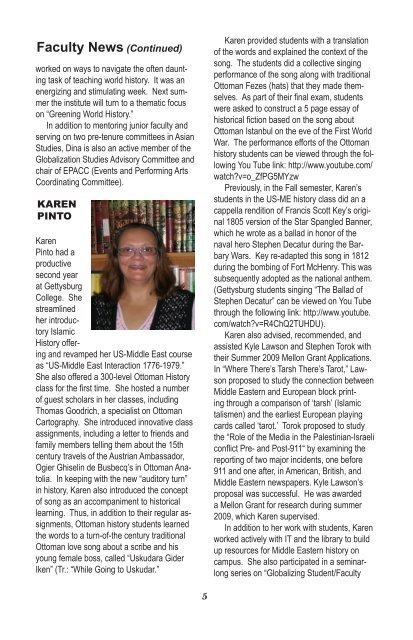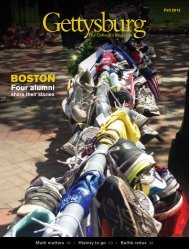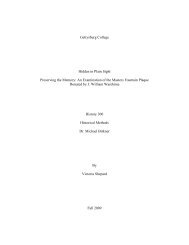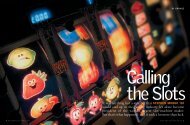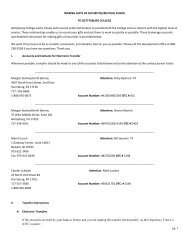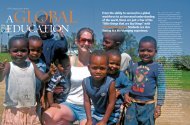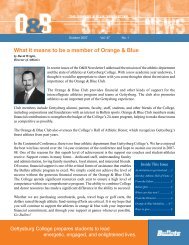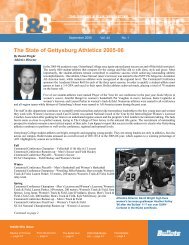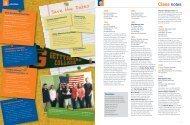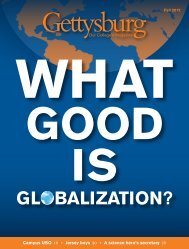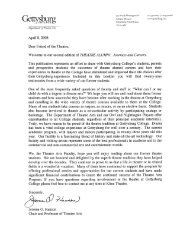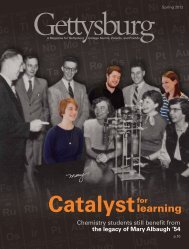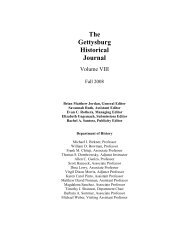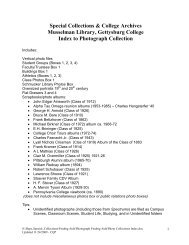From the History Department - Gettysburg College
From the History Department - Gettysburg College
From the History Department - Gettysburg College
You also want an ePaper? Increase the reach of your titles
YUMPU automatically turns print PDFs into web optimized ePapers that Google loves.
Faculty News (Continued)<br />
worked on ways to navigate <strong>the</strong> often daunting<br />
task of teaching world history. It was an<br />
energizing and stimulating week. Next summer<br />
<strong>the</strong> institute will turn to a <strong>the</strong>matic focus<br />
on “Greening World <strong>History</strong>.”<br />
In addition to mentoring junior faculty and<br />
serving on two pre-tenure committees in Asian<br />
Studies, Dina is also an active member of <strong>the</strong><br />
Globalization Studies Advisory Committee and<br />
chair of EPACC (Events and Performing Arts<br />
Coordinating Committee).<br />
KAREN<br />
PINTO<br />
Karen<br />
Pinto had a<br />
productive<br />
second year<br />
at <strong>Gettysburg</strong><br />
<strong>College</strong>. She<br />
streamlined<br />
her introductory<br />
Islamic<br />
<strong>History</strong> offering<br />
and revamped her US-Middle East course<br />
as “US-Middle East Interaction 1776-1979.”<br />
She also offered a 300-level Ottoman <strong>History</strong><br />
class for <strong>the</strong> first time. She hosted a number<br />
of guest scholars in her classes, including<br />
Thomas Goodrich, a specialist on Ottoman<br />
Cartography. She introduced innovative class<br />
assignments, including a letter to friends and<br />
family members telling <strong>the</strong>m about <strong>the</strong> 15th<br />
century travels of <strong>the</strong> Austrian Ambassador,<br />
Ogier Ghiselin de Busbecq’s in Ottoman Anatolia.<br />
In keeping with <strong>the</strong> new “auditory turn”<br />
in history, Karen also introduced <strong>the</strong> concept<br />
of song as an accompaniment to historical<br />
learning. Thus, in addition to <strong>the</strong>ir regular assignments,<br />
Ottoman history students learned<br />
<strong>the</strong> words to a turn-of-<strong>the</strong> century traditional<br />
Ottoman love song about a scribe and his<br />
young female boss, called “Uskudara Gider<br />
Iken” (Tr.: “While Going to Uskudar.”<br />
5<br />
Karen provided students with a translation<br />
of <strong>the</strong> words and explained <strong>the</strong> context of <strong>the</strong><br />
song. The students did a collective singing<br />
performance of <strong>the</strong> song along with traditional<br />
Ottoman Fezes (hats) that <strong>the</strong>y made <strong>the</strong>mselves.<br />
As part of <strong>the</strong>ir final exam, students<br />
were asked to construct a 5 page essay of<br />
historical fiction based on <strong>the</strong> song about<br />
Ottoman Istanbul on <strong>the</strong> eve of <strong>the</strong> First World<br />
War. The performance efforts of <strong>the</strong> Ottoman<br />
history students can be viewed through <strong>the</strong> following<br />
You Tube link: http://www.youtube.com/<br />
watch?v=o_ZfPG5MYzw<br />
Previously, in <strong>the</strong> Fall semester, Karen’s<br />
students in <strong>the</strong> US-ME history class did an a<br />
cappella rendition of Francis Scott Key’s original<br />
1805 version of <strong>the</strong> Star Spangled Banner,<br />
which he wrote as a ballad in honor of <strong>the</strong><br />
naval hero Stephen Decatur during <strong>the</strong> Barbary<br />
Wars. Key re-adapted this song in 1812<br />
during <strong>the</strong> bombing of Fort McHenry. This was<br />
subsequently adopted as <strong>the</strong> national an<strong>the</strong>m.<br />
(<strong>Gettysburg</strong> students singing “The Ballad of<br />
Stephen Decatur” can be viewed on You Tube<br />
through <strong>the</strong> following link: http://www.youtube.<br />
com/watch?v=R4ChQ2TUHDU).<br />
Karen also advised, recommended, and<br />
assisted Kyle Lawson and Stephen Torok with<br />
<strong>the</strong>ir Summer 2009 Mellon Grant Applications.<br />
In “Where There’s Tarsh There’s Tarot,” Lawson<br />
proposed to study <strong>the</strong> connection between<br />
Middle Eastern and European block printing<br />
through a comparison of ‘tarsh’ (Islamic<br />
talismen) and <strong>the</strong> earliest European playing<br />
cards called ‘tarot.’ Torok proposed to study<br />
<strong>the</strong> “Role of <strong>the</strong> Media in <strong>the</strong> Palestinian-Israeli<br />
conflict Pre- and Post-911“ by examining <strong>the</strong><br />
reporting of two major incidents, one before<br />
911 and one after, in American, British, and<br />
Middle Eastern newspapers. Kyle Lawson’s<br />
proposal was successful. He was awarded<br />
a Mellon Grant for research during summer<br />
2009, which Karen supervised.<br />
In addition to her work with students, Karen<br />
worked actively with IT and <strong>the</strong> library to build<br />
up resources for Middle Eastern history on<br />
campus. She also participated in a seminarlong<br />
series on “Globalizing Student/Faculty


